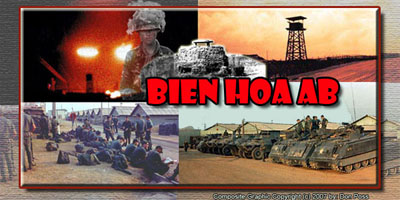|
|
Biên Hòa AB
Remembering
Tet 1968
By:
Howard G. Yates,
12th Air Commando Squadron
(Augmentee: 3rd Security Police Squadron),
Biên Hòa AB,
Republic of Vietnam
1967 - 1968
© 2006
|
"I remember thinking, Oh, God, they’re all dead."
|
Before I begin my story I would like to give recognition to several special folks. They have all played a special role in my life for which I will be eternally grateful.First and foremost to Ellen my bride of 36 years: Thank you for your encouragement and support. Being an Air Force wife wasn’t easy and neither was being a cop’s wife. You did both with grace, wisdom and steadfast love.
|
-
To Larry Wasserman, my Vietnam buddy and long time friend: Thanks for the memories. I will always remember your friendship, character, patriotism, integrity and terrific sense of humor but most of all I will remember your courage.
- To Senior Master Sergeant Pete Piazza, USAF Retired (Silver Star): Thanks for jump starting the memory banks. And thanks for your bravery in the face of the enemy. You Sir are an American Hero.
- Lastly I would like to offer my most sincere gratitude and highest personal commendation to the men of the
3rd Security Police Squadron, Biên Hòa AB, RVN. Your unrelenting courage and personal acts of selfless bravery will be remembered by all who lived through the 68’ Tet Offensive.
|
Remembering Tet
Finally I can lay my head back and try to get some shut eye, but I doubt that I will. I’m too keyed up to sleep. This little bit of “home away from home” we call a hooch is quiet enough, except for some muffled conversation in the day room, but my mind is in overdrive rehashing the events of the last 24 hours and wondering what the next 24 will bring.
Photo: Howard Yates refueling aircraft (12th Air Commandos), Jan 1965 (closeup follows).
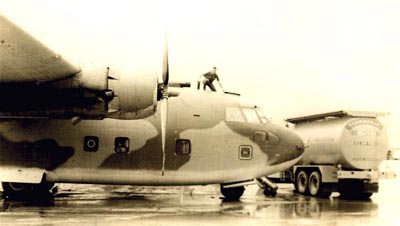 What the heck was I thinking when I volunteered to join the Security Police Augmentees (reserves) with those other guys from my outfit? That’s just it — I wasn’t thinking — I did it instinctively. I’d often thought about being a cop and even tried to enlist into the law enforcement field but my recruiter said I couldn’t get in. He said I wasn’t tall enough, or they didn’t have any openings, or some other contrived reason. I think he just needed to fill a mechanic’s slot and I was the lucky winner. What the heck was I thinking when I volunteered to join the Security Police Augmentees (reserves) with those other guys from my outfit? That’s just it — I wasn’t thinking — I did it instinctively. I’d often thought about being a cop and even tried to enlist into the law enforcement field but my recruiter said I couldn’t get in. He said I wasn’t tall enough, or they didn’t have any openings, or some other contrived reason. I think he just needed to fill a mechanic’s slot and I was the lucky winner.
|
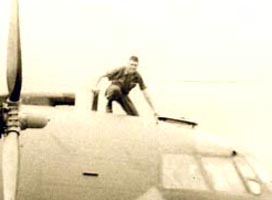 Anyway I was being offered a chance to hang out with the “Sky Cops” and get away from the flight line for a while, so they didn’t have to twist my arm. Besides, what harm could come from spending some time with the Security Police? At least I’d get to carry an M16 instead of a tool bag and I wouldn’t be getting all dirty and greasy. It sure seemed like a great idea to me. Little did I realize the gravity of my decision.
Anyway I was being offered a chance to hang out with the “Sky Cops” and get away from the flight line for a while, so they didn’t have to twist my arm. Besides, what harm could come from spending some time with the Security Police? At least I’d get to carry an M16 instead of a tool bag and I wouldn’t be getting all dirty and greasy. It sure seemed like a great idea to me. Little did I realize the gravity of my decision.
It seems like just a few short hours ago that several of us, including my buddy Larry Wasserman, were returning to Biên Hòa Air Base from the bustling little town of Biên Hòa. As we walked past the guard shack, the sentry asked, “Hey, aren’t you guys Augmentees?” I thought his recognizing us was so cool that I blurted out “Yeah, we are.” “Well, you better get your gear and report to the SP armory, ASAP.” “Why... what’s up?” Larry inquired. The Security Policeman just glanced up with this “we’re in a world of hurt” expression on his face and pointed to the security placard over the door — It was red. Now, we knew darn well what that meant. “Condition Red” means attack is imminent. Even so, we convinced ourselves that this was probably just a readiness drill.
We hustled to our hooch, grabbed our web belts, helmets and what ever else we thought we might need and made tracks to the SP squadron armory.
By the time we arrived, preparations for the defense of Biên Hòa Air Base were well underway. Weapons and ammunition were being issued at the supply window in a hurried but very orderly manner. Security Police and Augmentees already equipped gathered in small groups, talking amongst themselves. Some were busy checking and rechecking their weapons while others were stuffing bandoleers and every available pocket with extra ammo magazines. The air was filled with an undertone of anxious chatter and an occasional plume of cigarette smoke. When it came my turn at the armory window, I was handed an M16 and told to grab some ammunition. I asked, “How much can I take?” Now, I don’t remember this guy’s rank or what he looked like, for that matter, but I do remember his overly accommodating reply: “Partner, you can take as much as you think you’ll need.” That comment dashed any thought I had of this exercise being a drill. I stuffed every pocket so full that I clanked when I walked.
No sooner did we get our ammo, when someone yelled “Tenhut!” An officer, later identified to me as Lt. Colonel Kent Miller commander of the 3rd Security Police Squadron, walked hastily into our midst and began, “We don’t have time for that;” (meaning the proper protocol) and immediately told all present to sit down and listen up. He began his briefing by pointing to an aerial infrared photo map that had just been rolled out and made particular reference to the area shaded in red. (The Colonel’s briefing was a long time ago so I will paraphrase his comments.) That big red blob you see to the east of Biên Hòa Air Base is what military intelligence believes to be, a battalion size concentration of North Vietnamese and Viet Cong soldiers.
When I heard the word “battalion” I had no inkling of what that meant in terms of numbers, (The Air Force had "squadrons" not "battalions") but having seen most of John Wayne’s war movies I figured that a battalion was more folks than we wanted trying to get in, uninvited!
I was assigned with Larry and a young fellow named Terry, whose last name escapes me, to ride with SP (Security Police) Sergeant Lee Richards and Airman First Class Simmons. Our call sign was “Defense 6” and our duties that night consisted of traveling the entire circumference of Biên Hòa Air Base along what was appropriately called “Perimeter Road” and delivering hot coffee, sandwiches, and ammunition to the various guard posts.
|
Photo: Biên Hòa AB, Bunker Hill-10, Tet 1968.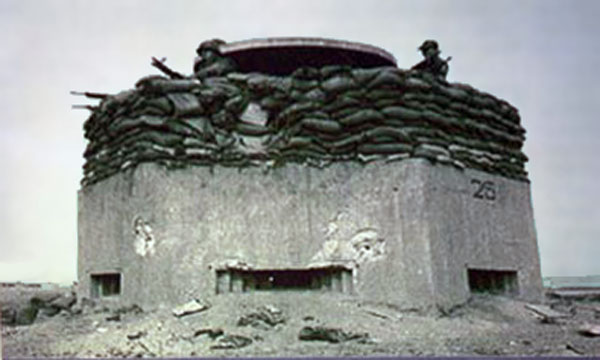
It was somewhere around 0200 hours (2 a.m. for you civilians) that we pulled up next to Bunker Hill-10 (an old French concrete fortification that was somewhat modified with sandbags and lumber to meet Air Force needs). Simmons and Richards chatted briefly with a couple of the occupants and while I don’t remember the exact conversation I do remember the exchange of several one-liners meant to fend off the anxious tension that we all felt. As we pulled away Simmons told them we would see them on our next trip around.
|
We drove north along Perimeter Road and passed some 8 to 10 augmentees, who had taken up a defensive position, just south of the Army’s Military Police Check Point. We exchanged some rather earthy salutations with them, also meant to ease the tension, and drove on to the MP check point. Even though the MPs at the check point were Army we did the Air Force thing and offered them some coffee. They told us they were good to go, so we moved on. We drove around to the west side of the Check Point and Simmons parked the truck. He told us that we might want to grab a bite from our box lunches while we had the chance. In retrospect the timing of his statement was perfect; eerie, but perfect.
I ate my sandwich and drank some coffee but saved my apple for later. I lit a cigarette and pushed my helmet back on my head. Almost immediately I heard this “crackling and whooshing” noise right over my head. My first thought was, “What the hell was that?” Within seconds I found out: It was the first of many 122 mm rockets to slam into our base in those early morning hours. It hit southwest of our position with a gut wrenching explosion that plumed into a bright orange and red mushroom cloud. From our vantage point it looked as if our own squadron area (the 12th Air Commandos) had been blown to bits. I remember thinking, Oh, God, they’re all dead.
I’m not sure if it was Richards or Simmons but somebody yelled “Get out!” I didn’t have to think about it, I just reacted. We all hit the ditch alongside the road about the time the second or third rocket hit the ground. For a moment I thought I had swallowed an earth quake. My insides shook uncontrollably. I kept telling myself, “You’re okay man, settle down," but my stomach said, “Screw you, I’m scared.” Rockets fell for what seemed like fifteen or twenty minutes, and then all fell quite. This reprieve was to be short lived.
Defense Control requested that Defense 6 (that was us) deliver some flares to Bunker Hill-10. Sergeant Richards promptly advised that sniper fire from outside the perimeter was keeping us pinned down.
Staff Sergeant Pete Piazza, supervisor of the re-supply teams, pulled up from the west and collected some flares from our truck. He put his three augmentees under the control of A1C Simmons and had Sgt Richards acCO him back the way he came to find another route to Bunker Hill-10.
|
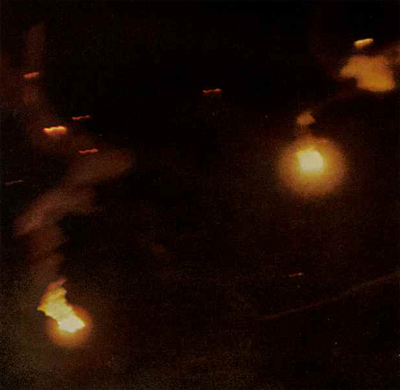
Not long after they left, a static filled transmission came over Simmons’ radio. It was a Windy unit (Security Police K-9 handler) calling Defense Control to advise that his dog was alerting on the fence line and he requested permission to pop a hand flare. “Permission granted” came the reply. We could see the flare streaking into the dark night. Pop! It burst into a glow bright enough to light up a football field and then began its slow wobbly descent. Almost immediately we heard a brief but distinct sound of small arms fire. The Windy unit, we learned later, had stirred a covey of VC just outside the wire.
|
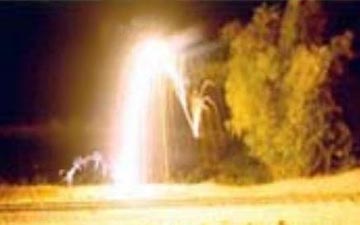 Then we heard “Pop-whoosh” noises on the perimeter and the darkness was illuminated by what looked like gigantic 4th of July sparklers. Simmons broke the news. “Trip flares! They’re coming across the wire!” Then we heard “Pop-whoosh” noises on the perimeter and the darkness was illuminated by what looked like gigantic 4th of July sparklers. Simmons broke the news. “Trip flares! They’re coming across the wire!”
Oh, this is not going to be a good night, I thought.
I remember saying, more out of apprehension than curiosity, “I wonder how many are out there.” Without taking his eyes off the trip flares, Simmons came back with, “Hard telling.” Well, that sure didn’t make me feel any better. Then it started: small arms and machine gun fire erupted all over the east perimeter.
Simmons led us down a slope to a knoll about 15 or 20 yards from where we had left the truck. We ran, crouched and crawled through patches of burned elephant grass. The Air Force periodically burned the thick tall grass to provide a better field of fire for defenders, and eliminate any potential hiding places for Charlie (The Viet Cong). The ash from the burnt grass that was like black talcum powder. It stuck to everything and got up our noses, in our ears and eyes. If there was an upside to the stuff, I guess it was nature’s way of blacking out our faces.
|
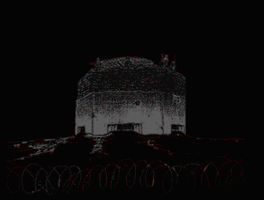 The VC attacking forces were making their way from the perimeter towards the interior of the base, in a westerly direction. Their path was to our south and took them directly into the unrelenting hail of fire from various Security Police positions, including Bunker Hill-10. The fighting was intense on both sides. We listened to the Defense Control radio to keep track of what was going on. The radio voices from the midst of battle were those of determination, and courage, but we could tell they were having a tough time of it.
The VC attacking forces were making their way from the perimeter towards the interior of the base, in a westerly direction. Their path was to our south and took them directly into the unrelenting hail of fire from various Security Police positions, including Bunker Hill-10. The fighting was intense on both sides. We listened to the Defense Control radio to keep track of what was going on. The radio voices from the midst of battle were those of determination, and courage, but we could tell they were having a tough time of it.
Our direction from Simmons was fairly straight forward and simple: we were to hold this position because “When they try to get out of here, they’ll be coming right this way!” I dropped my head down and thought, “Damn, he had to say that."
Weapons firing was intense and deafing. As I lay there peering over the top of the knoll, with my M16 poised for the inevitable, I suddenly felt the gravity of our situation. I was pretty sure that I wasn’t going to make it home. I made my peace with the Almighty, asking Him for courage in the face of the enemy and to take care of my loved ones back home.
During the heaviest fighting we could see silhouettes running around the aircraft run-up pad, but due to darkness we were uncertain if they were enemy infiltrators or Security Police defenders. Not wanting to hit any Americans we held our fire until we were absolutely certain about our target. We could also see and hear the blistering fire power coming from Bunker Hill-10, or — the Little Alamo — as it would come to be known. We could see and feel explosion after explosion as the enemy’s handheld rockets blasted the bunker, but the defensive fire never stopped. I remember thinking, “Those poor guys are taking a pounding. I hope they can hold on.”
|
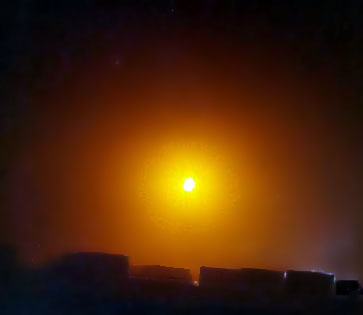
Puff the Magic Dragon, an old C-47 aircraft left over from WWII and capable of turning the jungle into tossed salad with its 7.62 mm Gatling guns, droned overhead and began dropping flares. What a welcome sight. As the first couple of flares drifted toward earth we were suddenly confronted by staggering dark figures, arms outstretched, looming out of the darkness. Three of us opened fire but the bullets ricocheted. Simmons looked at us and calmly said, “Grave markers." It seemed we had parked ourselves right on the edge of an old French cemetery. Man did I feel relieved; stupid but relieved.
About that time Simmons left to retrieve some hand flares from the truck but he must have gotten pinned down. It seemed like forever before we saw him again.
|
Tracers had been zipping all around but for some reason the fighting seemed to subside momentarily. Having been out there for what seem a life time, but in actuality was only three or four hours, I had a hankering for a smoke. By this time our ears were ringing and talking in a normal voice just wouldn’t cut it. I got Larry’s attention and motioned that I wanted a cigarette. He mouthed “I don’t have any.” “You don’t have any — what happened to them?” I barked. “I dropped the pack. If you want one, they’re out there.” With that he pointed to the open field where the tracers had once again had begun to fly. I thought “Nah, never mind.” So I took out my two cigars and tossed him one. I motioned that I needed a light by mimicking the use of a cigarette lighter. Larry looked at me, grinned and pointed to the open field. I agreed it was probably a bad time to light up.
We knew from the chatter on the radio that Tan Son Nhut Air Base was also under heavy rocket and ground attack. What we didn’t know was; so was every other US installation in South Vietnam.
As the SP Defense Forces began making progress in repelling the invasion we could see the enemy had apparently gathered in and around a drainage ditch east of the runway. We figured they were either regrouping for another try or preparing to get out of Dodge. We prepared ourselves for the onslaught of their retreat, but it never came in our direction.
Sometime before dawn I heard that familiar whup, whup, whup of heilocopter rotors overhead. It was an Army Huey gunship. I don’t remember if I just thought, “Hot damn. We got em now!” or if I actually yelled it out. The Huey daring pass at the run up pad and drainage ditch area and cut loose with a couple of rockets. Oh, that was so awesome! Then he circled around and hit'em again. On about his third pass he came way too close to us so Larry grabbed the radio and called Defense Control, yelling, “Break, Break!" He had to yell to clear the channel. “Defense Six to Defense Control.” “Go ahead Defense Six” came the reply. “We are in an unmarked position, on the east perimeter near the old graveyard and the gun ship is firing almost on top of us.” Control came back with an answer that we really didn’t want to hear. “We don’t have direct communications with the Army choppers, just try to let them know you’re friendlies.” Oh great! I’m gonna die here, I thought. As the gunship made another pass overhead, Larry, in an attempt to signal the pilot, waved his hands and “shot him a bird.” The door gunner, observing Larry’s gesture, returned his salute and the pilot redirected his fury in the other direction.
The fighting continued well into the morning, but the resilience of the North Veitnameese and Viet Cong was apparently running out of steam. The small arms fire had but for an occasional burst fallen silent. We took stock of our situation and discovered that our ammunition had nearly been exhausted.
By the time afternoon rolled around, teams of Security Police, augmentees and a handful of Army troops (from whence they came I have no idea) had begun forming up to perform security sweeps which were done to detect and apprehend or neutralize any stragling VC or NVA. There were also reports of snipers on base which didn’t do anything for my comfort level.
Side-by-side we began a slow, methodical and very cautious sweep from the perimeter to the runway. As we neared the drainage ditch, which ran perpendicular to the runway, someone shouted, “Hold up!” I stopped and looked towards my left and saw a Security Police member (I think he was an NCO, maybe a Staff Sergeant) standing in the open, confronting a subject. There was a loud “pop” and the Sergeant went down. What ensued was a brief but devestating report from at least 10 nearby defenders. Another VC had gone to the “Big Rice Paddy in the Sky.”
As we conducted our search along the drainage ditch I was walking behind one of those soldiers who showed up to give us a hand. He looked like he had been in the field for six weeks. He was dirty, smelly, grungy and unshaven but he was also loaded for bear and I for one was glad he was there.
Ahead of us and to the left, down in the ditch, was a clump of brush wherein several VC had set up a machine gun position. The VC machine gunner and a couple of his buddies were floating, motionless, on top of the bloody water. Suddenly the ground pounder in front of me let loose with a burst from his Tommy gun. He killed them all; again. Then he turned towards me, spit a mouthful of tobacco juice on the ground and said, “I thought I saw one move.” Larry taped me on the back and commented, “That boy’s been in-country way too long.”
Rounding the corner of the maintenance shack on the east end of the runway and still very vigilant for enemy snipers, I was confronted by a picture that will be forever etched in my memory: A Viet Cong gorilla fighter lay dead under a portable power unit (a big tractor) which he had used for cover during the night. One of his arms had been peeled back at the shoulder and everything above his eyebrows was gone, the obvious result of intense fire power from the Security Police bunker on the air field. Somehow I overcame the urge to heave my guts out.
|
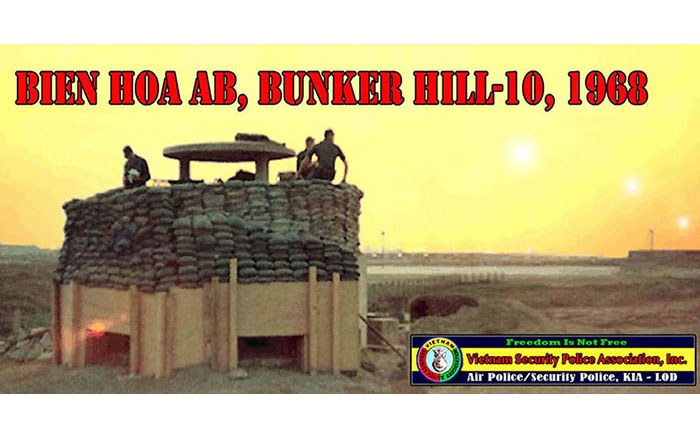
Biên Hòa AB, SPS Bunker Hill-10, Jan 1965: days later. By: Howard Yates
|
We completed our part of the sweep and were told to gather up near the end of the runway. The officer in charge dismissed several of us, “Men, go get some chow and some sleep. We will no doubt need you again tonight.” Larry and I just looked at each other. I know what he was thinking, but I won’t repeat it.
We turned to leave but lingered just long enough to watch the Quan Canh, South Vietnamese Air Force Police, interrogate a few prisoners, who were sitting on a log with their hands restrained. In a sudden fit of rage one of the Quan Canh rifle butted a restrained prisoner on the side of the head and knocked him to the ground. Now what he did was probably not in keeping with the rules of the Geneva Convention but I just grinned and thought, “Whoops — wrong answer.”
The black dust from the scorched elephant grass was smeared on my sweaty and greasy face. In fact we were all filthy, exhausted, and hungry. Our first priority was to head in the direction of the chow hall. As we approached the control tower on the way we notice a couple of officers surveying the damage to a shiny blue and bullet-riddled staff car. Suddenly one of the officers, a colonel, saw us walking toward him. We simultaneously rendered the best salute we could, given our condition. The Colonel snapped to attention whipped his hand through the air and popped one of the finest salutes I have ever seen on us. He asked us if we doing okay and I said, “Fine Sir, Thank you.” His came back with “Oh, no, it is I who should be thanking you. You guys saved our butts last night.” As he dropped his salute he said something like, I’ll bet you men are tired and hungry. We agreed, and went on our way.
I had a suspicion that the cook wasn’t feeling very hospitable as we shuffled up to the serving line. He barely made eye contact but continued to wipe down the grill. “I just cleaned this thing so nothing till dinner,” he grumbled. We stood there in disbelief staring at him. When he did look up he got an eyeful. He saw four scruffy looking airmen, weapons slung over their shoulders and the look of hungry puppies on their faces. He stared for a moment and then stammered, “Were you out there…on the perimeter…all night? Damn man — why didn’t you say something?” That was the best hot breakfast I’ve had in a long time.
I made a quick trip to the officer’s showers; they had hot water, washed off two layers of grime and then shuffled back to the hooch. I crawled into my bunk and laid my head back.
“Finally, I can get some shut eye.”
Howard G. Yates
12th Air Commando Squadron
(Augmentee: 3rd Security Police Squadron,
Biên Hòa AB, RVN)
Biên Hòa AB, Republic of Vietnam 1967-1968
|
| |
|

Comments to Don Poss
© 1995-2023 War-Stories.com. All Rights Reserved.
|
